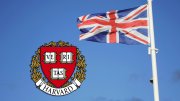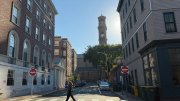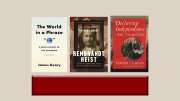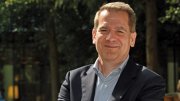If you arrived early Saturday morning at the Cambridge Rindge and Latin School (CRLS) on Presidents' Day weekend, you might have been surprised at the hordes of well-dressed students milling about, most lugging Rubbermaid tubs, nicknamed "oxes," filled with paper and files. The 2,500 high-school debaters from across the country filled not only every classroom at CRLS and the College but more rooms at nearby Longfellow School. And from 8 in the morning until well past 10 each night, they debated in what organizers call "the U.S. Open of forensics."
The Harvard Debate Tournament, billed as the largest forensics competition in the English language, is the main source of revenue for Harvard's policy-debate team, one of the College's most intensive--and lowest profile--undergraduate extracurricular activities. Even though you won't find the team listed on Harvard's website or recruiting at the fall activities fair, it is one of the best in the nation, having won six national championships since such tournaments began in the late 1940s. Policy debaters will carefully explain that their version of competitive speech is fundamentally different from the better-known Lincoln-Douglas and parliamentary styles: it's a thinking exercise, not a rhetorical exercise. "The judges don't care how you say it; they care what you say," says debater Todd D. Fine '03. In policy debate, it's all about the details.
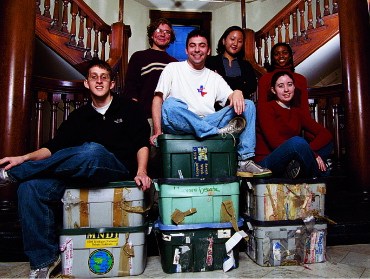 |
| Debaters and their mounds of arguments and evidence. Clockwise from top left: James L. Wilson '02, Eun Young Choi '02, Keia D. Cole '03, Christine A. Malumphy '05, Todd D. Fine '03, and Eli S. Rosenbaum '05. |
| Photograph by Stu Rosner |
"Everything is fair game"
Although debate traces its history back to Socrates and Plato, policy debate on the college level began at the end of World War II, when the U.S. Military Academy began hosting a small invitational for 25 schools in the hope of creating a strong circuit. The first tournament consisted entirely of northeastern schools, and although many of those schools--like Amherst, Mount Holyoke and St. Anslem's--have long since dropped out, policy debate has built a strong following.
When West Point could no longer support the program, the National Debate Tournament (NDT) fell under the auspices of the American Forensics Association. Although there are now several college tournaments, the NDT is the oldest and most prestigious. Each year, at the beginning of August, the forensics association and the Cross-Examination Debate Association (CEDA) announce the topic that will be debated in the national finals the following March. Most topics are broad, forcing debaters to master dozens of subtopics.
This year's topic--that the federal government should increase its control over tribal lands--requires familiarity not just with the history of U.S.-Indian relations, but also with issues like federal employment policies, civil-rights legislation, geology, philosophies of "ownership," and even seemingly unrelated subjects like nuclear testing and contemporary political polls. Everything is fair game. "This is not a game for dabblers," explains Dallas G. Perkins Jr., J.D.'75, Harvard's policy-debate coach since 1980.
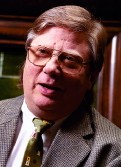 |
| Dallas Perkins coaches the nationally ranked team. |
| Photograph by Stu Rosner |
Because policy debate emphasizes research, analysis, and critical thinking, few, if any, points are awarded for oratorical skills. Besides, with the debaters speaking close to 300 words per minute, there's no time to revel in an artful phrase or a witty aside anyway. (The average person speaks about 60 words per minute and the world record is 637 words per minute.)
"There's no assertion of fact in our debates, everything must be proved," Perkins says. Thus, as soon as the topic is announced, debaters head for libraries and on-line databases like LEXIS-NEXIS. By the time the first debate begins, each team will have divided up the thousands of pages of relevant evidence, and each point will have been summarized and distributed to the other members of the team. Harvard's vast resources give its debaters a leg up on the competition. "We're lucky because we have the best library system in the world," Fine says. "We can find things other people can't." During the course of the circuit, each debater will amass enough evidence to fill four or five tubs, a pile about five feet high, and will have to start carrying the reams of evidence on a dolley. Compounding the burden, each team member must be able to debate both the "affirmative" and the "negative" side of an argument.
By mid September, the actual debating has begun. Seven or eight weekends a year, several of the team's debating pairs travel to other tournaments--which begin promptly at 7 a.m., when the judges announce the match-ups for the weekend and who argues the affirmative and the negative sides. The first set of debates begins promptly at 8, because any extra preparation time can tip the outcome.
The tournaments are mentally exhausting, with each pair involved in as many as eight 90-minute debates. "To be a debater is to be a talker--and a listener," sociologist Gary A. Fine, Ph.D. '76, Todd's father, writes in his new book, Gifted Tongues: High School Debate and Adolescent Culture. The elder Fine goes on to explain that even though the first speech is often memorized before-hand, everything else is extemporaneous, relying on a quick mind to offer rebuttals and counter-arguments to literally hundreds of subtopics and thousands of pieces of evidence.
(The research does not end with the topic at hand, either. The teams learn as much about the judges--often former debaters, debate coaches, or professors--as they can; whether a judge is conservative or liberal will often determine which arguments a team uses. And beyond their own work and research, teams also learn what positions opposing teams will argue, preparing outlines of their main arguments and subtopics.)
All college policy debaters compete on the same circuit--there aren't separate conferences or leagues, as in sports--and some of the best teams come from little-known schools. While Yale and Princeton do not field teams, highly respected squads come from Whitman College, Gonzaga, and the State University of West Georgia. Large state universities from Texas, Kansas, Iowa, Michigan, and Alabama also compete strongly. Northwestern, which has won eight NDTs, is the all-time leader; Harvard and Dartmouth round out the top three.
Despite their national prominence, Harvard's debaters remain low-key about themselves--if not about their work and research. The seven two-person pairs Harvard has fielded this year constitute among its largest-ever showing--most years, three or four pairs will compete, with research help from a handful of other students. Perkins allows the team members to match themselves in pairs, eschewing the policies of coaches at other big debating schools who will keep a pair of debaters together for all four years. The bottom line: the game should still be fun. Perkins's efforts have paid off: Harvard has won two of its national championships under his tutelage, most recently in 1989 (when the subject was whether the government should increase regulation of pollution). In addition, Harvard finished second in 1981, 1991, 1994, and 1995--losing the last two times narrowly to Northwestern.
Harvard debate is also largely self-supporting. Although most of the annual budget comes from fees levied on participants in the Presidents' Day debate (organized through the group's website: www.harvard-debate.org), the team also prepares research materials for high-school debate teams. (The high-school and college circuits have separate topics.) The group uses its annual revenues of nearly $250,000 to pay the salaries of one full-time coach and a couple of part-time assistants and to cover the team's expenses for travel, its publication business, and the costs of holding the February debate.
The Debaters
Todd Fine, a former Georgia state champion, became involved in policy debating only because his father, now a professor at Northwestern--the pinnacle of policy-debate schools--was researching Gifted Tongues while Todd was growing up. As his son worked his way up the debate circuit, winning several national awards along the way, the elder Fine spent a decade learning the ins and out of high-school debate and policy-debate strategy.
His book is the most in-depth look available at the unique culture of debate--a program that Fine posits as one of the successes of American education. "In a society concerned about the perceived failures of its educational institutions," Fine writes, "high school debate is a voluntary activity in which some students--a small and highly select group--choose to engage in research, practice socially valued skills, and demonstrate these abilities in public settings."
His study provides one of the first demographic profiles of who actually debates: competitors are overwhelmingly white (83 percent), usually male (64 percent), and mostly from middle- or upper-class families. Their average SAT score, 1270, is far above the national average.
| Qualifying for the National Debate Tournament happens three ways. First, 16 two-person teams a year receive a first-round at-large bid; the pairs are selected by the NDT steering committee in a public ballot based on detailed examination of the records of those teams applying for the bids. Second, district qualifying tournaments are held the first weekend in March in the NDT's nine geographical regions; these tournaments yield 46 more teams. (Harvard's district includes New York and New England.) Third, the NDT steering committee selects 12 additional teams as second-round at-large bids; these are generally deserving teams that had bad luck at the district level. But the committee may also select up to four pairs from four different schools who are allowed to qualify a third pair for the second round at-large bid process; otherwise, a school is only allowed to qualify two teams to the NDT. (Harvard coach Dallas Perkins notes proudly that the College has qualified at least one team for the NDT every year since 1955--the longest such streak in the record books.) |
Despite those high SAT scores, many high-school policy debaters concentrate so hard on the circuit and miss so much school traveling from tournament to tournament that their grades are not always good enough to get into highly competitive schools like Harvard. Students will spend entire summers at debate "institutes" on college campuses, mastering the art of argument and learning to talk ever more cohesively--and ever faster.
In recent years, the Harvard team and its alumni have urged the admissions office to respect policy debating more. The team does not actively recruit, relying instead on its reputation within the high-school debate community to garner potential new members. And, once admitted, the small group of policy debaters has an excellent future. Despite the long hours of travel and research, Harvard's team members say that the knowledge they gain from the experience helps them to excel academically. "I'll put the average GPA of my team up against any other activity at Harvard," Perkins says proudly. "My debaters have exceptional grades." Members regularly go on to top law schools, which see policy debate as a strong credential--with good reason. Tyler professor of constitutional law Lawrence H. Tribe '62, J.D. '66, for example, won the national debate tournament in 1961. Perkins says policy debate has helped several alumni land clerkships at the U.S. Supreme Court.
When Perkins himself was a debater at Georgetown, he met an ambitious freshman debater from MIT named Lawrence H. Summers. During the next four years, Summers became one of top debaters in the country. "He was famous for proving that just about anything led to nuclear proliferation," Perkins recalls. (High-school policy debaters still love to tie their opponents' arguments to Armageddon.) Perkins also notes that the future U.S. Secretary of the Treasury ran circles around other debaters on economic issues. Now, installed as president of Harvard, Summers credits his four years on MIT's policy-debate team with helping him argue persuasively and develop critical skills that he has used throughout his public career. "I think more clearly because debate helped me learn to organize my thoughts," he says. His colleagues joke that he can hardly have a conversation without dividing up and numbering his points. Perhaps most importantly, Summers says that debating taught him to recognize that there are always two sides to every argument. "I've been taught," he says, "to listen very carefully to what the other guy is saying."
Author Garrett Graff '03, a history concentrator, is an executive editor of the Harvard Crimson.

